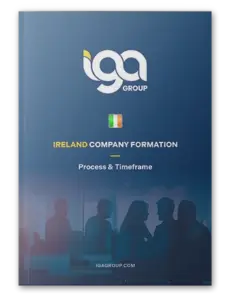Ireland
Company Formation
Ireland has become one of the most attractive jurisdictions for businesses, particularly in technology, pharmaceuticals, financial services and digital industries.
As a member of the European Union, Ireland offers access to the EU single market and provides a highly favourable tax regime.
The country’s skilled workforce, pro-business environment and strong legal system make it a preferred destination for both start-ups and multinational corporations. With a corporate tax rate of 12.5%, Ireland is one of the lowest tax jurisdictions in the EU, further boosting its appeal for international business.
?
Why Ireland
- Ireland is an excellent choice for businesses seeking a favorable tax regime, access to the EU single market and a highly skilled workforce.
- With a competitive corporate tax rate of 12.5%, it offers one of the lowest rates in the EU.
- Its holding company regime provides tax exemptions on dividends and capital gains from subsidiaries.
- Ireland’s workforce excels in technology, pharmaceuticals and financial services, while its stable legal framework ensures strong investor protections.
- Start-ups benefit from government grants, a vibrant tech ecosystem and low corporate taxes, making Ireland a prime business destination.
Key Contacts
Alexia Panzavecchia
Claire Marie Calleja Zammit
Downloads
Useful Links
Key Information Overview
| Types of Companies | Private Limited Company (Ltd), Public Limited Company (PLC), Branch | |
| Minimum Share Capital | Ltd: €1, PLC: €25,000 | |
| Registered Office | Must have a registered office in Ireland | |
| Shareholders & Directors | At least 1 shareholder, 1 director (1 director must be EEA resident) | |
| Bank Account | Must open a local Irish bank account | |
| Tax Regime | 12.5% corporate tax, 25% for passive income | |
| Time to Complete Incorporation | 1-2 weeks | |
| Annual Maintenance Costs | Varies by company size; includes registration fees, compliance and accounting | |
| Audit Requirements | Mandatory for larger companies | |
| Market Access | Access to the EU and international financial markets | |
| Key Benefits | Low corporate tax, access to skilled labor, EU membership | |
| Legal Framework | Based on common law | |
| Physical Presence Requirements | Registered office is required; physical presence not mandatory | |
| Corporate Governance Requirements | At least 1 director and 1 shareholder | |
| Language Requirements | English | |
| Tax Residency Rules | Managed and controlled from Ireland | |
| Required Documents | Memorandum & Articles of Association, ID proof, registered office address | |
| Compliance & Reporting | Annual returns, financial statements, VAT filings | |
| Employee and Payroll Requirements | Must comply with Irish employment laws, including PAYE and PRSI |
Types of Companies
Ireland offers a range of corporate structures designed to accommodate different business needs, from start-ups to large multinational corporations.

01
Private Limited Company (Ltd)
- The most common type of company in Ireland, suitable for small and medium-sized businesses. Provides limited liability to shareholders.
- No minimum share capital requirement.
02
Public Limited Company (PLC)
- Suitable for larger businesses, particularly those planning to raise capital or list on a stock exchange.
- Minimum share capital requirement: €25,000.
03
Branch of a Foreign Company
Allows foreign companies to establish a branch in Ireland, which operates as an extension of the parent company.
04
Partnership
Ideal for professional firms and joint ventures. Partnerships can be general or limited, offering flexibility depending on business needs.
05
Special Purpose Vehicles (SPVs)
Ireland is renowned for its use of SPVs, particularly in sectors like finance, real estate and asset management. These vehicles benefit from Ireland’s favourable tax regime, EU compliance and strong regulatory framework.
Holding Company
Ireland’s holding company regime is highly attractive, with exemptions on dividends and capital gains from qualifying subsidiaries. It’s widely used by multinational corporations to manage international investments.
Securitisation Vehicle
SPVs are commonly used in Ireland for securitising financial assets. The country’s robust legal framework and competitive tax regime make it a key jurisdiction for these structures.
Real Estate Holding Company
Ireland’s SPVs are often used to hold and manage real estate investments, providing tax-efficient solutions for international investors.
Investment Funds (AIFs, UCITS)
Ireland is a major hub for investment funds, particularly Alternative Investment Funds (AIFs) and UCITS, benefiting from EU regulations and access to global investors.
Start-Ups
Ireland offers an excellent environment for start-ups, particularly in sectors like technology, life sciences and fintech. The country provides a range of government grants, tax incentives and access to a highly skilled workforce, making it a top destination for new businesses.

Tax Incentives:
- Corporate Tax Rate: Ireland’s corporate tax rate of 12.5% is one of the lowest in the European Union.
- R&D Tax Credits: Generous tax credits are available for companies involved in research and development activities.
Government Grants and Support:
- Enterprise Ireland: Offers financial support, grants and mentoring for innovative start-ups, particularly those with high growth potential.
- Start-Up Refunds for Entrepreneurs (SURE): Provides tax refunds to entrepreneurs who invest in their own start-up.
Business Support:
Incubators and Accelerators: Ireland has a strong network of incubators and accelerators offering funding, mentorship and access to investors for start-ups.
Access to Markets:
EU Membership: As a member of the EU, Ireland offers start-ups access to the single market, enabling free trade across Europe.
Digital and Innovation-Friendly Environment:
Technology and Fintech Hub: Ireland is home to a thriving tech and fintech ecosystem, making it an ideal location for digital start-ups.
A
Grade A: Highly Start-Up Friendly
Ireland’s favourable tax regime, government support and strong business infrastructure make it an attractive destination for start-ups, particularly in sectors like technology and financial services.
Benefits
Incorporating in Ireland provides several strategic advantages for businesses, from a competitive tax regime to access to the European Union.
Low Corporate Tax Rate
Ireland’s corporate tax rate of 12.5% is one of the most competitive in the European Union, making it highly attractive for businesses looking for tax efficiency.
Access to EU Markets
As a member of the EU, Ireland provides businesses with access to the EU single market, allowing free movement of goods, services and capital.
Highly Skilled Workforce
Ireland offers access to a highly educated and skilled workforce, particularly in sectors like technology, pharmaceuticals and financial services.
Favourable Holding Company Regime
Ireland’s holding company regime offers tax exemptions on dividends and capital gains from qualifying subsidiaries, making it a key jurisdiction for multinational corporations.
Strong Legal Framework
Ireland’s legal system is transparent, compliant with EU standards and provides strong protections for businesses and investors.
Requirements
To establish a company in Ireland, several legal and administrative requirements must be met. Below are the basic requirements for incorporation.
01
Shareholders
A Private Limited Company (Ltd) requires a minimum of one shareholder. Shareholders can be individuals or legal entities, with no restrictions on nationality or residency.
02
Directors
At least one director is required and at least one of the directors must be resident in the European Economic Area (EEA). There are no nationality restrictions for directors.
03
Company Secretary
Every company must appoint a company secretary, who may be a natural person or a legal entity.
04
Registered Office
Every company must have a registered office in Ireland, which will serve as the official address for legal correspondence.
05
Minimum Share Capital
There is no minimum share capital requirement for Private Limited Companies (Ltd), though Public Limited Companies (PLC) must have a minimum share capital of €25,000.
06
Bank Account
A local or international bank account must be opened in the company’s name, where the initial share capital must be deposited.
Mergers & Acquisitions
TAILORED SUPPORT to fast-track your market entry
Our Mergers & Acquisitions services are designed to assist clients in acquiring existing companies with pre-established licenses, streamlining the process of entering or expanding in key markets. These services are particularly relevant for investors seeking to fast-track their market entry while ensuring efficient and compliant solutions.
Identifying Suitable Businesses
We help clients locate companies that meet their specific goals, focusing on entities with strong operational histories and the required licenses.
Legal and Regulatory Assistance
Our experts guide clients through the unique legal and compliance frameworks of each market, ensuring a smooth acquisition process with minimal risk.
Valuation & Due Diligence
We conduct in-depth assessments of the target company’s financial and operational status, providing transparency and confidence in the acquisition.
Post-Acquisition Support
For clients who decide to divest, we offer comprehensive services to facilitate the sale of the company and transfer of licenses.
Frequently Asked Questions
What is the corporate tax rate in Ireland?
Ireland offers a highly competitive corporate tax rate of 12.5%, making it a prime location for international businesses, particularly in the tech and iGaming sectors.
Does Ireland impose withholding taxes on dividends?
Yes, Ireland imposes a 25% withholding tax on dividends paid to non-residents, though this can often be reduced or eliminated under Ireland’s extensive network of tax treaties.
What legal structures are available for businesses in Ireland?
The most common structures are the Private Limited Company (Ltd) and Public Limited Company (PLC), both offering limited liability for shareholders.
Are audited financial statements required in Ireland?
Yes, companies in Ireland must file annual financial statements. Larger companies are required to have their financial statements audited, while small companies may qualify for an audit exemption.
What is the VAT rate in Ireland?
The standard VAT rate in Ireland is 23%, with reduced rates of 13.5% and 9% for certain goods and services.
Does Ireland have double taxation agreements?
Yes, Ireland has an extensive network of double taxation treaties with over 70 countries, helping businesses avoid double taxation on income.
Are there any residency requirements for directors in Ireland?
Yes, Ireland requires that at least one company director be a resident of the European Economic Area (EEA). However, companies can avoid this requirement by purchasing a bond to guarantee compliance.
What is the process for incorporating a company in Ireland?
Incorporation involves registering the company with the Companies Registration Office (CRO), drafting the company’s constitution, and appointing at least one director and a company secretary.
Does Ireland offer any tax incentives for businesses?
Yes, Ireland offers several tax incentives, including the Research and Development (R&D) tax credit, capital allowances for certain investments, and the Knowledge Development Box, which provides a reduced tax rate of 6.25% for income related to qualifying intellectual property.
How long does it take to incorporate a company in Ireland?
The incorporation process in Ireland typically takes around 2 to 3 weeks, depending on the completeness of the application and any due diligence requirements.
Need assistance?
Whether you have queries, need further assistance or would like to request a quote for any of our services, please don’t hesitate to contact us.
Leave your phone number and we’ll make sure to call you back.



